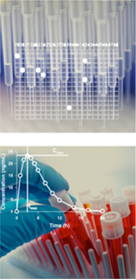Bioanalysis
Sample collection
Data storage , in silico tools

The qualitative and quantitative characterization of the effects associated with the administration of a compound to a model animal is the keystone of the drug discovery process. Indeed, this step is essential for estimating a future therapeutic effect and evaluating the risk-benefit ratio of a drug candidate. As such, it is a necessary step in most therapeutic innovation projects, before deciding to hire a candidate for clinical trials. In these experiments conducted in vivo, the variability of the pharmacodynamic response often requires large numbers to deliver significant results.
In a legitimate context of the 3R “Replacement, Reduction and Refinement” which governs the use of animal experimentation, it is essential to use in these experiments only compounds for which we will have previously proven in vitro, and later on a small number of animals, that they reach their site of action at the rate and concentration required to exert their effect.
Consequently, evaluation of ADME parameters which characterize Absorption, Distribution, Metabolism and Elimination is widely used in the discovery during target validation, hit-discovery, hit-to-lead optimisation stages. These parameters make it possible to assess the exposure of animals to the compound and to relate it to the importance of the effect and to the engagement of the target.
In this context, we have developed a platform that allows to evaluate these parameters rapidly and that provide project leaders with the relevant information to select the best compounds for in vivo experiments and to better interpret in vivo data. Moreover, these ADME data will drive the optimisation of the lead structure toward the best possible in vivo performance.
Know-how and services offered
Our ADME/PK and bioanalysis experts offer a custom-based service and experience. The animal experimentation carried out by our qualified staff take place in the animal facilities of the Pasteur Institute of Lille, with protocols reviewed by an ethics committee. Sample preparation and bioanalysis are performed by our engineers and technicians using our LC-MS/MS platform.
The services are performed in accordance with our laboratory procedures and the results transmitted in the form of a report, accompanied by raw data. Unless the customer refuses, the data is kept for at least 3 years on our servers. The prices of basic services are communicated on request
Processing of requests
The requests received are the subject of an interview with a scientific/technical manager of the laboratory in order to specify the request and its context. After analyzing the feasibility of the project, projects meeting the specifications are accepted in the order of arrival. The project starts after receipt of the client's agreement on the study proposed by the platform, on its quotation and on the schedule. The technical manager becomes the privileged contact for the customer until the end of the project.
Contacts